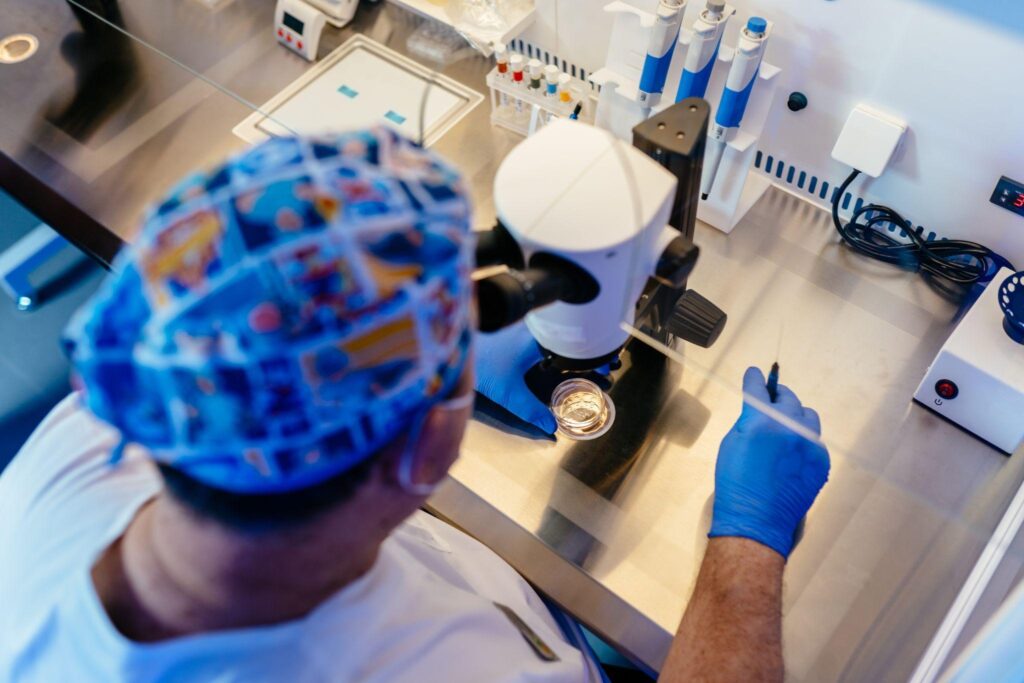Male fertility is a crucial piece of the family-building puzzle, yet it’s often overlooked. In reality, about 1 in 7 couples experience infertility, and in up to half of these cases, a male factor is at least partly responsible.
The good news is that male fertility issues are often identifiable and treatable. By getting a male fertility test (essentially finding out your fertility “score”) you take the first step toward understanding your reproductive health and options.
This article will educate you on male fertility problems, warning signs, testing methods, what the results mean, and what can be done to improve your chances of conception.
Signs and Symptoms of Male Infertility
Most of the time, male infertility doesn’t have obvious outward symptoms. The main sign is the inability to conceive a child with your partner despite a year or more of regular, unprotected intercourse. Many men with fertility issues feel perfectly healthy, which is why problems can go unnoticed until pregnancy doesn’t happen. Still, certain symptoms or medical clues can suggest an issue with male fertility:
- Sexual function problems: Difficulty with ejaculation (for example, low volume of semen), trouble maintaining an erection (erectile dysfunction), or reduced sexual desire can be red flags. These issues may point to hormonal imbalances or other underlying conditions.
- Pain or swelling in the testicles: Any pain, lump, swelling, or discomfort in the testicle or scrotum area could indicate conditions like varicocele (enlarged veins in the scrotum) or infection, which can affect fertility.
- Hormonal or genetic signs: Signs of hormonal abnormalities; such as decreased facial or body hair growth or abnormal breast development (gynecomastia) – may correlate with fertility problems. Certain genetic conditions can also have tell-tale signs (for instance, an inability to smell could be linked to a rare hormonal disorder affecting fertility).
- Other health clues: Frequent respiratory infections from a young age or a history of testicular surgeries or injuries might be related to fertility issues. Prior surgeries on the groin, testicles, prostate, or hernia repairs can sometimes impact reproductive function.
Tip: If you notice these signs or have been trying to conceive without success, schedule a male fertility test promptly.
Common Causes of Male Fertility Problems
Causes of male infertility can be medical, environmental, or lifestyle-related. Understanding them can help guide diagnosis and treatment.
Medical causes
- Varicocele – Enlarged vein in the scrotum that affects sperm production and quality. This condition raises the temperature in the testes, which can impair sperm development and function. It’s one of the most common and treatable causes of male infertility.
- Infections – STIs or reproductive tract infections that damage sperm or cause scarring. Inflammation from these infections can block sperm pathways or reduce sperm health. Even after the infection is treated, scar tissue may cause long-term fertility issues.
- Ejaculation disorders – Retrograde ejaculation sends semen into the bladder instead of out through the penis. This can be caused by nerve damage, certain medications, or surgeries involving the bladder or prostate. Men with this condition may still produce sperm, but it doesn’t reach the outside to fertilize an egg.
- Hormonal imbalances – Low testosterone or pituitary gland disorders. These hormonal issues can disrupt sperm production by affecting signals from the brain to the testes. They may also impact sexual function and overall reproductive health.
- Blockage – Scar tissue or congenital absence of the vas deferens preventing sperm transport. Injuries, surgeries, or infections can cause obstructions in the reproductive tract. In some cases, the blockage is present from birth due to genetic factors.
- Genetic conditions – Chromosomal abnormalities like Klinefelter syndrome. These conditions can affect testicular development and reduce or stop sperm production. Genetic testing can help identify these causes and guide treatment options.
Environmental causes
- Exposure to industrial chemicals, pesticides, heavy metals.
- Prolonged heat to the testicles from saunas, hot tubs, or extended sitting.
- Radiation or repeated X-rays.
Lifestyle causes
- Smoking, excessive alcohol, or anabolic steroid use.
- Obesity, poor diet, or chronic stress.
- Lack of exercise or poor sleep habits.
Why Fertility Testing Is Important for Men
Without testing, there’s no way to know your sperm health. A semen analysis is a simple lab test that can detect low sperm count, poor motility, or abnormal morphology.
Benefits of male fertility testing:
- Confirms or rules out male factor infertility.
- Identifies treatable conditions early.
- Saves time by directing treatment plans.
- Gives clarity and peace of mind.
The Cleveland Clinic notes that semen analysis tests are quick, private, and provide crucial information for a couple’s fertility plan.
Male Fertility Testing Options and Procedures
Your male fertility evaluation may include:
Medical History and Physical Exam
A doctor reviews your health history, lifestyle habits, past illnesses, surgeries, or injuries that could affect fertility. The physical exam assesses factors like varicocele, testicular size, and the presence of any lumps, swelling, or anatomical abnormalities. This step helps rule out obvious causes and guides which further tests are needed.
Semen Analysis
The main sperm test, usually done after 2–5 days of abstinence to ensure accuracy. You provide a semen sample that is analyzed in a lab for:
- Sperm concentration (how many sperm are present per milliliter) – low counts may indicate production issues.
- Motility (movement) – shows how well sperm swim toward the egg.
- Morphology (shape) – abnormal shapes can affect the ability to fertilize an egg.
- Volume, pH, and signs of infection – abnormal results here can indicate blockages, inflammation, or other underlying problems.
Blood Tests
These measure hormone levels, including testosterone, follicle-stimulating hormone (FSH), luteinizing hormone (LH), and prolactin. Abnormal hormone levels can point to issues with sperm production, testicular function, or brain signals regulating fertility.
Imaging
Ultrasound scans, such as scrotal or transrectal ultrasound, help detect blockages, cysts, varicoceles, or other structural problems in the reproductive tract. Imaging can also show if there’s fluid buildup or other abnormalities affecting sperm transport.
Genetic Testing
Recommended when sperm count is extremely low or absent. It checks for chromosomal abnormalities, gene mutations, or conditions like Klinefelter syndrome and Y-chromosome microdeletions that may explain infertility.
Testicular Biopsy
A small tissue sample from the testicles is examined to determine if sperm production is normal. This test can distinguish between production problems and blockages, and in some cases, sperm retrieved during the biopsy can be used for assisted reproductive techniques.
Table: Normal Reference Values for Semen Analysis
The following table outlines the World Health Organization’s standard reference values for a healthy semen analysis, serving as a benchmark for evaluating male fertility potential.
| Parameter | Normal Range* |
| Sperm concentration | ≥ 15 million/mL |
| Total sperm count | ≥ 39 million/ejaculate |
| Motility | ≥ 40% moving |
| Morphology | ≥ 4% normal forms |
| Volume | ≥ 1.5 mL |
| pH | 7.2–8.0 |
Interpreting Your Fertility Test Results
A normal sperm count means at least 15 million sperm per milliliter. Lower than this is considered low sperm count or oligospermia.
- Motility: At least 40% should be active swimmers.
- Morphology: 4% or more with a normal shape is considered normal.
- Volume & pH: Low volume may mean an issue with the seminal vesicles; abnormal pH can signal infection or blockage.
Abnormal results do not always mean you cannot conceive. Many men with below-average numbers become fathers naturally or with treatment.
Treatment Options and Next Steps
Once the cause of male infertility is identified, treatment can range from simple lifestyle adjustments to advanced medical procedures, depending on the severity and underlying issue.
Lifestyle Changes
Improving everyday habits can have a big impact on fertility. Quitting smoking and limiting alcohol helps prevent damage to sperm DNA and improves overall sperm health. Maintaining a healthy weight supports hormone balance, while managing stress reduces its negative effects on reproductive function. A nutrient-rich diet that includes zinc, selenium, and folate can boost sperm production and quality over time.
Medical Treatments
When lifestyle changes alone aren’t enough, medical treatments can address the specific underlying conditions affecting male fertility.
- Varicocele repair – A surgical procedure to correct enlarged veins in the scrotum, which can improve sperm production and quality.
- Medications for hormonal imbalances – These may include hormone replacement or drugs that stimulate the testes to produce more sperm.
- Antibiotics for infections – Used to treat reproductive tract infections that can harm sperm or block its pathway.
- Surgery for blockages – Removes scar tissue or repairs anatomical issues that prevent sperm from traveling out of the testes.
Assisted Reproductive Options
If medical treatments aren’t successful on their own, assisted reproductive technologies can help couples achieve pregnancy by working around certain fertility barriers.
- IUI (Intrauterine Insemination) – Involves placing concentrated, healthy sperm directly into the uterus during ovulation to increase the chances of fertilization.
- IVF with ICSI (In Vitro Fertilization with Intracytoplasmic Sperm Injection) – An advanced method where a single sperm is injected directly into an egg in a lab, ideal for severe sperm quality or quantity issues.
- Sperm retrieval – For men who have no sperm in their ejaculate, surgical techniques can collect sperm directly from the testes or epididymis for use in assisted reproduction.
Why Choose IVFLA Fertility for Male Fertility Testing in Murrieta and Beverly Hills
At IVFLA Fertility, patients benefit from advanced diagnostic tools, state-of-the-art laboratory facilities, and a compassionate, personalized approach to care. With locations in both Murrieta and Beverly Hills, our team is equipped to perform comprehensive male fertility testing (from semen analysis and hormone evaluation to genetic screening) ensuring no detail is overlooked.
Led by Dr. Steven C. Presser and Scientific Director Dr. Arjun Kadam, IVFLA combines decades of clinical experience with some of the highest pregnancy success rates in the nation. Whether you’re seeking answers after months of trying to conceive or want to take a proactive step in understanding your reproductive health, our specialists guide you through every stage of testing and treatment.
If you’d like to explore our full range of fertility services, click here to learn more.
FAQs
1. When should I get a male fertility test?
If you’ve been trying to conceive for 12 months without success, or 6 months if your partner is over 35, schedule testing. Go sooner if you have symptoms or a high-risk medical history.
2. Is an at-home fertility test reliable?
An at-home sperm test can measure sperm count but won’t check motility, morphology, or infection. Use them as a screening tool, not a replacement for a lab-based semen analysis.
3. Can lifestyle changes improve sperm count?
Yes. Quitting smoking, limiting alcohol, eating a nutrient-rich diet, and regular exercise can improve sperm quality in as little as three months.
4. Does low sperm count mean I can’t have kids?
No. Many men with low sperm counts father children naturally, and treatments like IUI or IVF can increase the odds.
Conclusion
Male infertility is common and often treatable. A semen analysis is the fastest way to know your fertility status and start a treatment plan. If you live in Southern California, IVFLA Fertility in Murrieta and Beverly Hills offers advanced diagnostic testing, expert care, and proven treatments for male fertility issues.
Don’t keep wondering about your chances to conceive. Check your fertility now and take the first step toward growing your family. Contact us today to schedule your male fertility evaluation and speak with our expert team.

Dr. Steven C. Presser is a Beverly Hills fertility specialist with over three decades of experience, trained at USC, Cedars-Sinai, and UCLA. He is widely recognized for his research and publications in reproductive health, nutrition, and fertility preservation, and is fluent in English, Spanish, and Hebrew.




